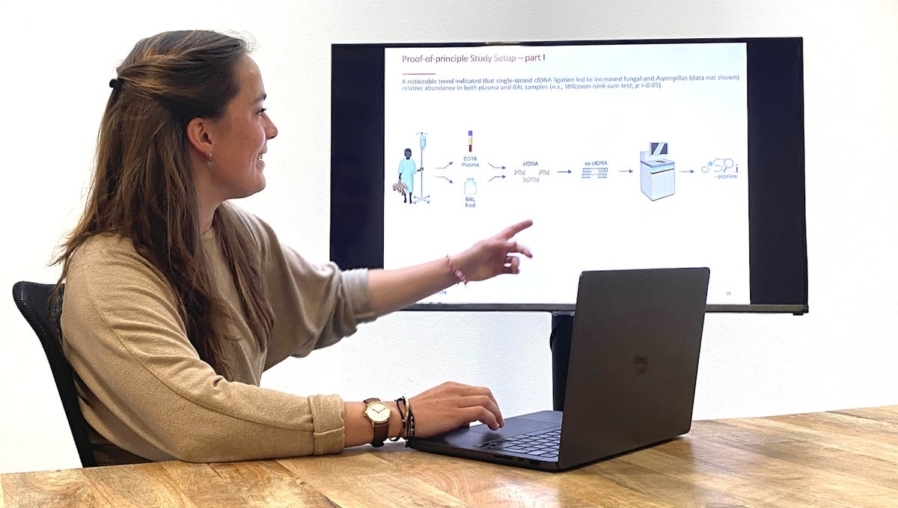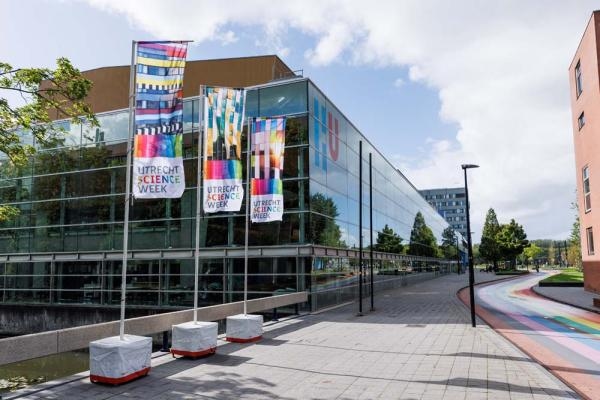Research on faster fungal diagnosis Princess Máxima Center, WKZ, Westerdijk Institute and UMC Utrecht

Researchers from the Princess Máxima Centre, the Wilhelmina Children’s Hospital (WKZ), the Westerdijk Institute, and UMC Utrecht have taken an important first step together towards a new DNA test for fungal infections in children with leukaemia or after a stem cell transplant. That test could allow for faster and more accurate diagnosis of this important complication in the future.
Every year, about 150 children in the Netherlands are diagnosed with leukaemia. During and after intensive treatment, their defences are weakened, making them especially vulnerable to infections. Sometimes fever develops and antibiotics do not help. Then a fungal infection is a possible cause. Such an infection is a serious complication that can delay or interrupt treatment.
Paediatric oncologist in training and researcher Laura Rotte of the Princess Máxima Centre sees the consequences of this in her work: ‘To find out whether a fungus is active, children now often have to undergo a lung flush under anaesthesia. Unfortunately, the fluid from the lung irrigation does not always succeed in determining exactly whether and which fungus is present.’
Fungal DNA as a clue
In collaboration with UMC Utrecht, the researchers investigated whether cell-free fungal DNA in the fluid obtained from the lung flush as well as blood could be used for diagnosis. Researcher Emmy Wesdorp, who worked at UMC Utrecht’s Centre for Molecular Medicine during the study and is now a bioinformatician in the Tytgat group at Máxima, explains: ‘We use advanced techniques to read out millions of DNA fragments. Only a fraction of them are from fungi. It’s like looking for dozens of white snippets in a full paper container of blue confetti.’
The research group of Oncode Institute researcher Prof Jeroen de Ridder at the Centre for Molecular Medicine developed a method to detect cell-free fungal DNA in samples. By comparing this DNA with large databases, the researchers were able to determine whether a fungal infection was present, and if so, which fungus caused it. In an initial test group of seven children suspected of having a fungal infection, Aspergillus fumigatus was found in both lung wash fluid and blood. In five of them, fungal DNA was also detected in the blood. This could be a much less stressful method than the usual lung flush for children.
The researchers published the results in npj Genomic Medicine.
Future application in the clinic
According to Prof Dr Louis Bont, paediatrician-infectiologist at the WKZ and clinical trialist of the Tissing Group at Máxima Hospital, the test is promising: ‘In the future, this may allow us to make better informed choices for targeted fungal treatment. That will help prevent unnecessary medication with associated side effects and organ damage. And that in turn improves the quality of life of children with cancer.’
The researchers hope to further expand the test to other types of fungi in the future. Our goal is a diagnostic test that is broadly applicable and low impact for children,’ says Rotte. Wesdorp adds: “We are at the beginning, but this research shows that it can work.”

Utrecht Science Week 2024: 3 Programme Highlights
From 27 September to 6 October, Utrecht Science Week highlights health and sustainability through events like a debate on scientific activism, a preventive health seminar, and the Sustainable City Challenge finale.

Ombion Centre for Animal-free Biomedical Translation celebrates launch and site opening
On July 7, 2025, the Ombion Centre for Animal-free Biomedical Translation was officially launched and opened its location at Utrecht Science Park. The centre promotes the transition to animal-free medical innovations and collaborates with over 60 partners on research, education, and practical implementation.

“An Academic Quarter with…”
The shortcast series “An Academic Quarter with…” takes you on a 15-minute journey to surprising spots at Utrecht Science Park, sharing stories about sustainability, biodiversity, and history. Listen on Spotify or at one of the recycled listening poles on campus.

Utrecht Science Week 2025 programme announced
The programme for Utrecht Science Week 2025 has been announced. From now on, you can register for one or more of the many inspiring events. More events will follow in the coming weeks. Take a look, register for the events you would like to attend and don’t miss anything!